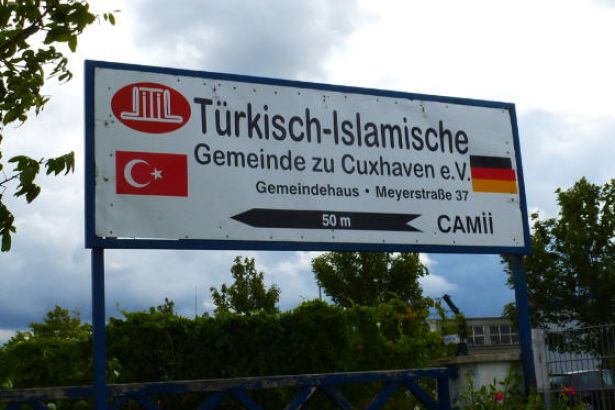Turkey-Germany tension rises over 'spy imam' crisis

Turkey’s Minister of Justice Bekir Bozdağ has fiercely condemned Germany for the police raid to residences of four Turkish imams in Germany that are affiliated with the Turkish-Islamic Union for Religious Affairs (DİTİB), a branch of the Turkish Directorate of Religious Affairs (Diyanet).
In a written statement, Bozdağ said that “performing searches in houses of four religious officials although freedom of thought and faith is secured by international conventions on human rights and the German constitution is clearly a violation of international conventions and the German constitution.”
Bozdağ blamed Germany for “not fulfilling the requirements of a state of law despite having numerous evidence regarding PKK, DHKP-C and the Gülenist organisation,” which are classified as terrorist organisations in Turkey. “The investigation and raids initiated after the spying slander against Turkish religious officials show how easily German authorities accredit the claims by terrorists and terror organisations operating against Turkey,” continued Bozdağ.
Stating that the DİTİB was founded according to the German law and works in compliance with the German legislation under the supervision of German authorities, Bozdağ suggested that statements made by German Minister of Justice Heiko Maas constituted intervention to the investigation. “There is no doubt that the unfair, baseless, and arbitrary treatment and investigation regarding Turkish religious officials will harm the amicable relations between two countries,” said Bozdağ.
It is expected that the Director of the Diyanet Mehmet Görmez will soon hold a press conference concerning the matter.
DİTİB CANNOT BREAK CONNECTIONS WITH ANKARA IN SHORT RUN
Discussions on collaboration with the DİTİB and the DİTİB to break its connections with Ankara are still occupying the agenda of Germany. Volker Becker, spokesman of the German Greens in charge of religious affairs and MP, in an interview, asserted that it was “not a realistic expectation” that the DİTİB will break its connections with the Turkish state swiftly. “The DİTİB can’t move that fast in the end. It will have to pay the wages of 900 imams from its own pocket. How can this be possible?” he continued. He also said that the DİTİB’s organisational and financial separation from the Turkish state can only be possible “if people have a say in their local communities and if they support it financially.”
Beck stated that if the Muslim religious communities in Germany want to be classified on the same level as the churches, these religious communities “are inevitable to get reorganised.” Expressing that Germany needs Muslim religious communities, he said that Muslim should decide a potential “reorganisation” by themselves and that the state shouldn’t get involved.
According to the spokesman, the DİTİB has a “religious-constitutional system error.” Arguing that the organisation “is under the command of the Turkish Prime Minister as a subsidiary organ” of the Diyanet in Turkey, “The DİTİB’s mission has always been to direct the religion in favour of the then rulers and theirs interests,” stated Beck.
Beck also accused the German politicians of “cutting the corners.” He told that from social democrats to conservatives, all politicians in power had a pragmatic “makes no odds” attitude regarding the DİTİB problem and continued: “By making a call on Ankara, they made a show that everything is solved.” Beck stated that this situation had continued until the political majority in Turkey seemed approving the opinions of Germany.
On the other hand, Gökay Sofuoğlu, head of the Turkish Community in Germany (TGD), has warned that the collaboration with the DİTİB shouldn’t be suspended. In an interview to the German press, “Stopping the collaboration would strengthen the hand of the radicals.” said Sofuoğlu. Claiming that the DİTİB is the only moderate Islamic organisation in Germany, he said: “Apart from the imams assigned by Ankara, many young imams of the second generation are taking part in the DİTİB Executive Board and are striving for reforms.” For this reason, Sofuoğlu said, “wholesale convicting” should be avoided. Lastly, he emphasised that spying accusations for the DİTİB should “precisely” be clarified and the association should manifest that “it doesn’t consider itself as a political organisation, but a religious community.”
DİTİB DENIES SPYING ACCUSATIONS
Erdinç Altuntaş, DİTİB’s chairman in the Baden-Württemberg state, denied the accusations against the DİTİB. “We haven’t taken any orders, nor did we take a step in that direction,” said Altuntaş in an interview. “We are a religious community, not an intelligence service.”
Altuntaş stated that it was improbable for Ankara to give such orders to the DİTİB representatives in Baden-Württemberg.
The DİTİB is being accused of sending information to Ankara about the members or sympathisers of the U.S.-based Islamic preacher Fethullah Gülen sect, which was one of the masterminds of last July's failed coup in Turkey. It is noted that Turkish imams had sent intelligence to Ankara about 28 people and 11 institutions. The lists are said to be prepared and sent to Ankara at the behest of the Diyanet by the DİTİB imams in the respective regions of the Turkish Consulates in Cologne, Düsseldorf, and Munich. The German police have recently raided the residences of four DİTİB imams in two German states in order to collect evidence.




